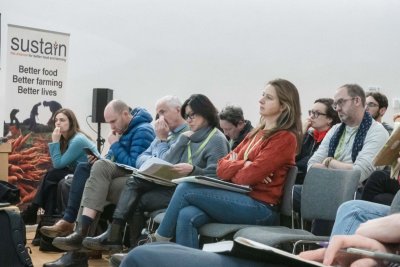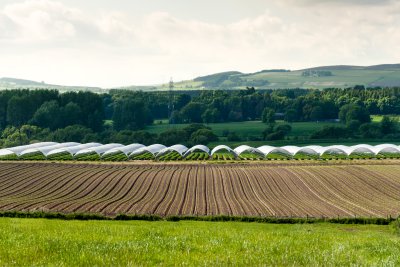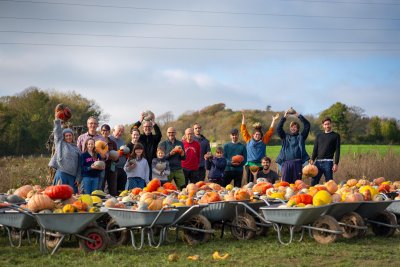 Rows of cabbages ready for picking. Copyright: GordonBellPhotography | istock
Rows of cabbages ready for picking. Copyright: GordonBellPhotography | istock

Sustain welcomes government commitment to a Horticulture Growth Strategy
Advocacy brings long-awaited opportunity to shape how the country will grow more fruit and veg, support good jobs, and build a fairer, greener food system.
Sustain has welcomed the commitment by Dame Angela Eagle, Minister of State for Food Security and Rural Affairs, to a Horticulture Growth Strategy. This is part of the wider Food Strategy to which the Government has committed, aiming to improve public health, reduce the environmental impact of food production, and create a secure and resilient food system.
Fruit and vegetables are a key opportunity for growth – the nation eats far less than the recommended amount for good health; and British growers are missing out even on the current market opportunities, with the UK importing nearly half of the vegetables and over 80% of the fresh fruit we eat. Shifting to a more plant-based diet, and away from intensively produced meat and dairy, has also been identified as a key way to reduce the climate impact of our food system. After several failed attempts by previous governments to develop a horticulture strategy, Minister Dame Angela Eagle’s announcement marks a significant step towards addressing long-standing challenges in the UK’s horticulture sector: from labour shortages and unfair dealing to underinvestment in local food infrastructure and better routes to market.
For years, Sustain and its members have been calling for a comprehensive plan to grow more of the fruit, vegetables and pulses we need to live healthy lives, tackle climate change and support nutrition security. The alliance has repeatedly shown that horticulture is one of the most effective investments government can make: it can boost public health, support jobs across the country, and cut the climate footprint of our food system.
Government acknowledges vital role of horticulture
In a letter setting out the commitment, sent to the UK Fruit and Vegetable Coalition, of which Sustain is a founding member, Dame Angela said:
“Horticulture has a vital role to play in delivering economic growth, improving public health, and addressing environmental challenges. The Government remains committed to supporting British growers and ensuring our food system is fit for the future. Increasing domestic fruit and vegetable production is essential not only for food security, but also for tackling poor dietary health and reducing our reliance on imports. Issues such as the cultivation of peat soils, labour shortages, supply chain fairness, and the financial pressures facing growers are active areas of concern within Defra.”
Sustain welcomes this recognition of the challenges facing UK growers and the importance of expanding domestic fruit and vegetable production as a cornerstone of food security and public health.
“Horticulture is at the heart of a resilient food system.”
Glen Tarman, Sustain’s Director of Policy and Advocacy, said:
“We’re delighted the Government has finally recognised what we and our members have been saying for years: that horticulture is fundamental to a healthy, sustainable food system. It needs a dedicated strategy.
The UK has world-class growers, but they need fair dealing, skilled labour, access to land, and investment in infrastructure, innovation and better routes to market.
A well-designed Horticulture Growth Strategy could help us grow far more of the fruit, veg and pulses we need, support livelihoods in rural and peri-urban communities, and make healthy food affordable and accessible to everyone. This must be a strategy rooted in fairness - for farmers, workers and consumers alike - and grounded in nature-friendly, climate-resilient farming.”
Hannah Gibbs, manager of the Bridging the Gap programme coordinated by Sustain, which pilots ways to make fruit, vegetables and pulses accessible and affordable to lower income communities, said:
“Making horticulture a strategic priority for the country means we can join up efforts to help British growers and chefs serve more nature-friendly fruit, veg and pulses on children’s plates, in schools across the country. It could also accelerate the growth of voucher schemes that help households on a lower income, and GP patients with diet-related illness, to access the delicious, fresh food they need to keep themselves and their families healthy and well fed. We have piloted and evaluated inspiring models for how this could work in practice, and look forward to the Horticulture Growth Strategy driving a lasting shift in the nation’s diet, in a way that also helps growers and the environment.”
Read more about the Bridging the Gap’s pilots.
A blueprint for better food and farming
Sustain has long campaigned for a national horticulture strategy, arguing that a thriving fruit and vegetable sector is key to:
- Improving public health: helping people eat more of the fresh produce recommended in the Eatwell Guide.
- Creating green and decent jobs: supporting fair pay and conditions across the food chain.
- Tackling the climate and nature emergency: promoting agroecological and organic horticulture that protects soils, pollinators and biodiversity.
- Strengthening food security: reducing dependence on imports and building resilience to local, national and global shocks.
Download Home-grown: A roadmap to resilient fruit and vegetable production in England.
What needs to happen next
Sustain is calling for the Horticulture Growth Strategy to include:
- Clear targets for increasing UK fruit, vegetable and pulse production and consumption.
- Priority support for growers using nature-friendly agroecological and organic methods.
- Investment in training, skills, farm worker protection, access to land and infrastructure.
- Public procurement and retailer commitments to buy more British-grown fruit, veg and pulses, using their power to prioritise driving the market for produce grown using nature-friendly agroecological and organic methods, and to pay fair prices and uphold principles of fair dealing.
- Alignment with the upcoming Environmental Improvement Plan, 25-Year Farming Roadmap, Land Use Framework, Food Strategy action plan, climate policies (including a decisive move away from use of peat and lowland peat-based soils for horticulture) and other government policies to ensure effective action, joined-up government and policy coherence.
Glen Tarman added:
“This is a crucial opportunity to make sure our food system works for people and planet -not just for short-term profit. Government must now work closely with growers, civil society and local authorities to make this Horticulture Growth Strategy deliver real change on the ground.”
Sustain is now in dialogue with Defra officials in the Food Strategy and Horticulture Policy Team, along with alliance members and others in the UK Fruit and Vegetable Coalition.
Sustain: Sustain The alliance for better food and farming advocates food and agriculture policies and practices that enhance the health and welfare of people and animals, improve the working and living environment, enrich society and culture and promote equity.
Sustain
The Green House
244-254 Cambridge Heath Road
London E2 9DA
020 3559 6777
sustain@sustainweb.org
Sustain advocates food and agriculture policies and practices that enhance the health and welfare of people and animals, improve the working and living environment, promote equity and enrich society and culture.
© Sustain 2026
Registered charity (no. 1018643)
Data privacy & cookies
Icons by Icons8







